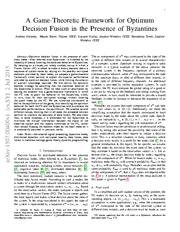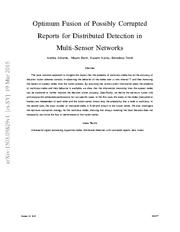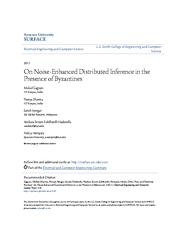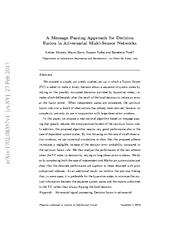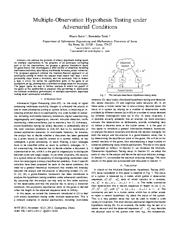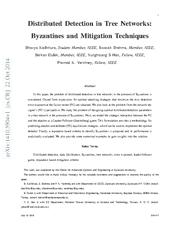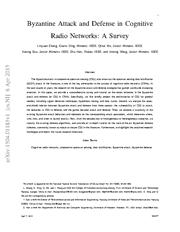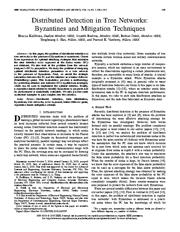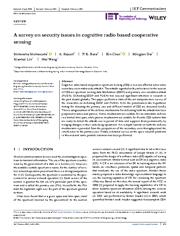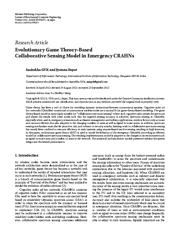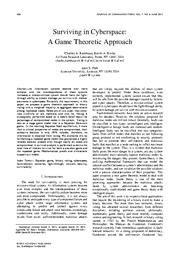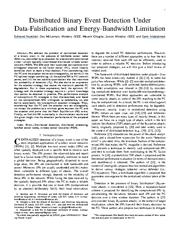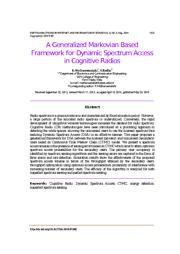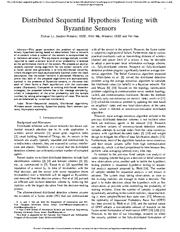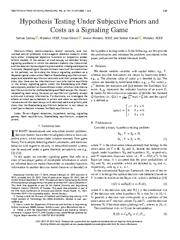A copy of this work was available on the public web and has been preserved in the Wayback Machine. The capture dates from 2020; you can also visit the original URL.
The file type is application/pdf.
Filters
A Game-Theoretic Framework for Optimum Decision Fusion in the Presence of Byzantines
[article]
2015
arXiv
pre-print
Optimum decision fusion in the presence of malicious nodes - often referred to as Byzantines - is hindered by the necessity of exactly knowing the statistical behavior of Byzantines. ...
by local nodes, we propose a game-theoretic framework which permits to exploit the superior performance provided by optimum decision fusion, while limiting the amount of a-priori knowledge required. ...
While the adoption of a game-theoretic framework to model decision fusion in the presence of Byzantines has been used before, its adoption as an alternative to optimum decision fusion in the absence of ...
arXiv:1507.00400v1
fatcat:6chp56blkzdyreucyapczjme7u
Optimum Fusion of Possibly Corrupted Reports for Distributed Detection in Multi-Sensor Networks
[article]
2015
arXiv
pre-print
The most common approach to mitigate the impact that the presence of malicious nodes has on the accuracy of decision fusion schemes consists in observing the behavior of the nodes over a time interval ...
We also investigate the optimum corruption strategy for the malicious nodes, showing that always reverting the local decision does not necessarily maximize the loss of performance at the fusion center. ...
The value of δ depends on the value of P mal which is chosen by the Byzantines and then should be optimally determined in a game-theoretic framework (see [13] for an example in this sense). ...
arXiv:1503.05829v1
fatcat:epmxcxdi2nbp7lngnhg2awr7bq
On noise-enhanced distributed inference in the presence of Byzantines
2011
2011 49th Annual Allerton Conference on Communication, Control, and Computing (Allerton)
We also consider a game theoretic formulation where this problem of distributed detection in the presence of Byzantines is modeled as a minimax game between the Byzantines and the inference network, and ...
We consider two metrics -the minimum number of Byzantines (α blind ) needed to blind the fusion center as a security metric and the Kullback-Leibler divergence (DKL) as a detection performance metric. ...
In Section IV, we present a game-theoretic formulation of the noise-enhanced distributed inference problem in the presence of Byzantines. ...
doi:10.1109/allerton.2011.6120307
dblp:conf/allerton/GagraniSINVCV11
fatcat:l6pfanys2fdwpc5uhhasy7ufx4
A Message Passing Approach for Decision Fusion in Adversarial Multi-Sensor Networks
[article]
2017
arXiv
pre-print
We consider a simple, yet widely studied, set-up in which a Fusion Center (FC) is asked to make a binary decision about a sequence of system states by relying on the possibly corrupted decisions provided ...
In this paper, we propose a near-optimal algorithm based on message passing that greatly reduces the computational burden of the optimum fusion rule. ...
Since P mal is usually not known to the FC, in [18] the value of P mal used to define the optimum fusion rule and the value actually used by the Byzantines are strategically chosen in a game-theoretic ...
arXiv:1702.08357v1
fatcat:adewuxvhgfgmbam22xmarpjuea
Multiple-observation hypothesis testing under adversarial conditions
2013
2013 IEEE International Workshop on Information Forensics and Security (WIFS)
We derive the equilibrium point of the game in an asymptotic set up, showing that a dominant strategy exists for the analyst. ...
We propose a general framework based on game-theory that encompasses a wide variety of situations including distributed detection, data fusion, multimedia forensics, sensor networks. ...
We point out that this scenario is somewhat different from the usual case of decision fusion in the presence of Byzantines [9] . ...
doi:10.1109/wifs.2013.6707800
dblp:conf/wifs/BarniT13
fatcat:pg6dgaq6pnainiuevqgnxasdcu
Distributed Detection in Tree Networks: Byzantines and Mitigation Techniques
[article]
2014
arXiv
pre-print
In this paper, the problem of distributed detection in tree networks in the presence of Byzantines is considered. ...
We also look at the problem from the network designer's (FC's) perspective. We study the problem of designing optimal distributed detection parameters in a tree network in the presence of Byzantines. ...
SYSTEM DESIGN IN THE PRESENCE OF BYZANTINES For a fixed attack configuration {B k } K k=1 , the detection performance at the FC is a function of the local detectors used at the nodes in the tree network ...
arXiv:1410.5904v1
fatcat:agt7n42mu5cnvpp4ybjqjphjiy
Byzantine Attack and Defense in Cognitive Radio Networks: A Survey
2015
IEEE Communications Surveys and Tutorials
In this paper, we provide a comprehensive survey and tutorial on the recent advances in the Byzantine attack and defense for CSS in CRNs. ...
Specifically, we first briefly present the preliminaries of CSS for general readers, including signal detection techniques, hypothesis testing, and data fusion. ...
helped us improved the quality of this paper significantly. ...
doi:10.1109/comst.2015.2422735
fatcat:dc3yq7dparbapht5nswwhhmzr4
Distributed Detection in Tree Networks: Byzantines and Mitigation Techniques
2015
IEEE Transactions on Information Forensics and Security
In this paper, the problem of distributed detection in tree networks in the presence of Byzantines is considered. ...
We also look at the problem from the network designer's (FC's) perspective. We study the problem of designing optimal distributed detection parameters in a tree network in the presence of Byzantines. ...
Next, we show that likelihood ratio tests remain optimal (under the conditional independence assumption) even in the presence of Byzantines and optimal decision rule for each node is independent of Byzantines ...
doi:10.1109/tifs.2015.2415757
fatcat:3ubnsn5arnds3dcppmkzykm5hi
A survey on security issues in cognitive radio based cooperative sensing
2021
IET Communications
Active mechanisms are suitable for an immediate defence in a limited time span, while passive mechanisms are suitable for flexible CSS systems that are ready to detect the attacks over a period of time ...
Then a categorization of the defence mechanisms for defending both the attacks has been proposed as active and passive. ...
In [79] , a game theoretic framework has been proposed to discard the PUEAs. The authors formulate a non-cooperative multistage game between the SUs and PUEs. ...
doi:10.1049/cmu2.12131
fatcat:ivw2dsepevfi5izquylly65jg4
Evolutionary Game Theory-Based Collaborative Sensing Model in Emergency CRAHNs
2012
Journal of Electrical and Computer Engineering
Game theory has been a tool of choice for modeling dynamic interactions between autonomous systems. ...
Cognitive radio ad hoc networks (CRAHNs) constituted of autonomous wireless nodes are a natural fit for game theory-based modeling. ...
Acknowledgments This paper was supported by CEEMS Laboratory at the International Institute of Information Technology Bangalore funded by the Government of Karnataka. The authors wish to thank Dr. ...
doi:10.1155/2012/696571
fatcat:2ar6ec7jsfecrn4lxnatugk324
Surviving in Cyberspace: A Game Theoretic Approach
2012
Journal of Communications
A survival analysis is performed to derive the total time of mission survival for both a one-shot game and the repeated game. Mathematical proofs and simulations support our model. ...
To satisfy this requirement, in this paper we propose a game theoretic approach to binary voting with a weighted majority to aggregate observations among replicated nodes. ...
The research in [2] proposes a witness-based approach for data fusion in wireless sensor networks. Wang et al. [3] analyzed the nodes decision in a cluster. ...
doi:10.4304/jcm.7.6.436-450
fatcat:7efdnkzuhzh3xix4sttryag7r4
Distributed Binary Event Detection Under Data-Falsification and Energy-Bandwidth Limitation
2016
IEEE Sensors Journal
We address the problem of centralized detection of a binary event in the presence of falsifiable sensor nodes (SNs) (i.e., controlled by an attacker) for a bandwidth-constrained under−attack spatially ...
The SNs send their quantized test statistics over orthogonal channels to the fusion center (FC), which linearly combines them to reach a final decision. ...
Detection in the presence of binary falsification 1 (Byzantine) attacks is considered in [26] . ...
doi:10.1109/jsen.2016.2583060
fatcat:nthvuuqdqfbpbb4lmgnarn2ake
A Generalized Markovian Based Framework for Dynamic Spectrum Access in Cognitive Radios
2014
KSII Transactions on Internet and Information Systems
We present a spectrum access scheme in the presence of sensing errors based on CTMC which aims to attain optimum spectrum access probabilities for the secondary users. ...
This paper proposes a generalized framework for DSA between the licensed (primary) and unlicensed (secondary) users based on Continuous Time Markov Chain (CTMC) model. ...
In [15] , a game theoretic framework and no regret learning algorithm was proposed for distributed adaptive channel allocation. ...
doi:10.3837/tiis.2014.05.002
fatcat:cd2ueqgjgzgyxjyyff33d5yvxe
Distributed Sequential Hypothesis Testing With Byzantine Sensors
2021
IEEE Transactions on Signal Processing
Moreover, we prove that both of the proposed algorithms are asymptotically optimal in the presence of Byzantine sensors, in the sense that each of them forms a Nash equilibrium with the worst-case attack ...
We propose an asymptotically optimal voting algorithm for the sensor network with a fusion center and generalize it to fully-distributed networks, where the algorithm stays asymptotically optimal under ...
In the absence of attack, the definition of optimality and the theoretical optimal of a detection strategy are introduced in Section II. ...
doi:10.1109/tsp.2021.3075147
fatcat:n6wco5x6wve3nkcmpkep65yamu
Hypothesis Testing under Subjective Priors and Costs as a Signaling Game
2019
IEEE Transactions on Signal Processing
In the context of such setups, we consider binary signaling problems in which the decision makers (the transmitter and the receiver) have subjective priors and/or misaligned objective functions. ...
Depending on the commitment nature of the transmitter to his policies, we formulate the binary signaling problem as a Bayesian game under either Nash or Stackelberg equilibrium concepts and establish equilibrium ...
In [8] , a Nash equilibrium of a zero-sum game between Byzantine (compromised) nodes and the fusion center (FC) is investigated. ...
doi:10.1109/tsp.2019.2935908
fatcat:hakshmex25haxm4v5mlwehjeqm
« Previous
Showing results 1 — 15 out of 117 results

